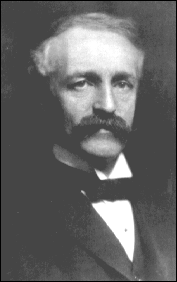Fire has always been a part of American ecosystems, particulary in the dry-summer, wet-winter West. Indians burned fields to clear underbrush make better hunting grounds, and make areas easier to defend. Throughout the white settlement of the West, settlers used fire to clear land for agriculture, and banded together to fight fires threatening homes.
 Gifford Pinchot |
The modern, federal effort to fight forest fires originates with Gifford Pinchot, who founded the US Forest Service in 1905. Pinchot believed that "The best way for the Government to promote [irrigation, grazing, and timber] is to protect the forest reserves from fire." (Pinchot 1905) One of the early chief foresters of the Forest Service, Henry Graves, called fire fighting "the fundamental obligation of the Forest Service [which] take precedence over all other duties and activities. |
Until the 1930s and the Civilian Conservation Corps (CCC), paid fire fighting crews were often hastily recruited from local streets and bars. The CCC gave the Forest Service the muscle to mount large fire fighting efforts. In 1935, the Forest Service announced its 10 a.m. policy: all resources will be assigned to control any fire on federal land by 10 a.m. the following day.
The smokejumper program was started in 1940. Surplus equipment from World War II--retardant planes, helicopters, trucks--supplied the fire crews of the 50s and 60s, and changed the way fires were fought.
In 1976, the 10 a.m. policy was replaced by "Appropriate Suppression Response" or "Confine, Contain, Control." Now, the fuel buildup from 90 years of successful fire suppression has made fires burn hotter and faster. Combined with the explosion of homes in the "wildland/urban interface," fire fighting in the 90s and the next century is a new game, demanding new talent and energy.
REFERENCES:
Thoele, Michael. "Fire line: Summer Battles
of the West." Fulcrum Publishing, Golden,
CO. 1995.
Pinchot, Gifford. "A Primer of Forestry." 1905. http://www.forestry.auburn.edu/coops/sfnmc/class/pinchot.html